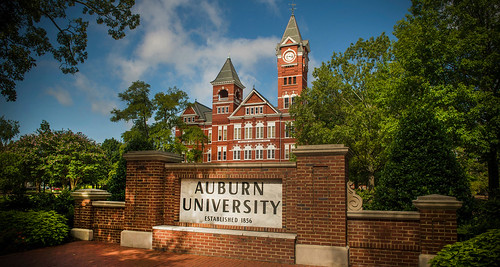Auburn University’s LAUNCH competition goes virtual
Article body
COVID-19 and its associated shutdowns have not stopped Auburn University’s LAUNCH competition from going forward. This year’s annual pitch competition will be held virtually through Zoom, the online meeting platform.
On May 13, some of Auburn University’s top entrepreneurial faculty will put forward ideas for research projects with potential to impact the economy of the state and region. Auburn’s Office of the Vice President for Research and Economic Development will select winning faculty recipients to receive support from its LAUNCH Fund for Research and Innovation.
Established in 2015 by the Auburn University Research and Economic Development Advisory Board, LAUNCH is a fund and an associated competition designed to bridge the gap between innovative research and the marketplace. The fund was created with the support of the Office of the Vice President for Research and Economic Development.
Five finalists will make presentations and must demonstrate their projects’ merit in the quest for up to $100,000 in funding, which can be awarded in varying amounts.
“The LAUNCH program is a great way for some of the most promising innovations of Auburn faculty to be brought to the marketplace for the benefit of the people of Alabama, the state and the region,” said James Weyhenmeyer, Auburn’s vice president for research and economic development.
Those selected will receive a cash award and the opportunity to meet with experts in entrepreneurship from Auburn’s Harbert College of Business and the university’s Office of Innovation Advancement and Commercialization.
The finalists and their proposals are:
-
Matt Hilliard, Peter He and Jin Wang, Department of Chemical Engineering: “Novel Circulating Coculture Biofilm Photobioreactor for Valorization of Anaerobic Digestion Waste” for a complimentary technology to improve anaerobic digestion, a process by which municipal waste streams are converted into value-added products, such as biofuel or animal feedstock.
-
Stewart Schneller, Department of Chemistry and Biochemistry: “Characterization of Antiviral Lead Compounds.” Modifications to known antiviral compounds have produced new compounds with reduced toxicity and effectiveness against several pathologically important viruses, including measles, Ebola, dengue and norovirus.
-
Ben Choe, Department of Mechanical Engineering: “Design of Prototypes of Lithium Ion Battery Packs for Demonstration of Fast and Safe Charging Method” for methods and software to shorten charging times for and to extend the lifetimes of lithium ion batteries used in phones, other portable devices and electric vehicles.
-
Zhihua Jiang, Department of Chemical Engineering: “Novel and Sustainable Feed Binder from Soy Hulls” for converting soybean hulls, a current agricultural waste stream, into a binder for aquaculture feed. Feed binders are widely used to hold or bind different components together for increasing the water stability and durability of aquaculture feed.
-
Majid Beidaghi, Department of Materials Engineering: “Development of Inks and Printing Technology for 3D Printing of Batteries” for the development and formulation of inks for the fabrication of batteries, including lithium ion batteries, through a simple extrusion-based 3D printing process.
These are examples of Auburn’s world-renowned faculty delivering solutions to pressing regional, national and global needs. More information about how Auburn supports experts through LAUNCH is available on the LAUNCH website.
Related Media
Media interested in this story can contact Communications Director Preston Sparks at (334) 844-9999 or preston.sparks@auburn.edu.
Auburn University is a nationally ranked land grant institution recognized for its commitment to world-class scholarship, interdisciplinary research with an elite, top-tier Carnegie R1 classification, life-changing outreach with Carnegie’s Community Engagement designation and an undergraduate education experience second to none. Auburn is home to more than 30,000 students, and its faculty and research partners collaborate to develop and deliver meaningful scholarship, science and technology-based advancements that meet pressing regional, national and global needs. Auburn’s commitment to active student engagement, professional success and public/private partnership drives a growing reputation for outreach and extension that delivers broad economic, health and societal impact.





